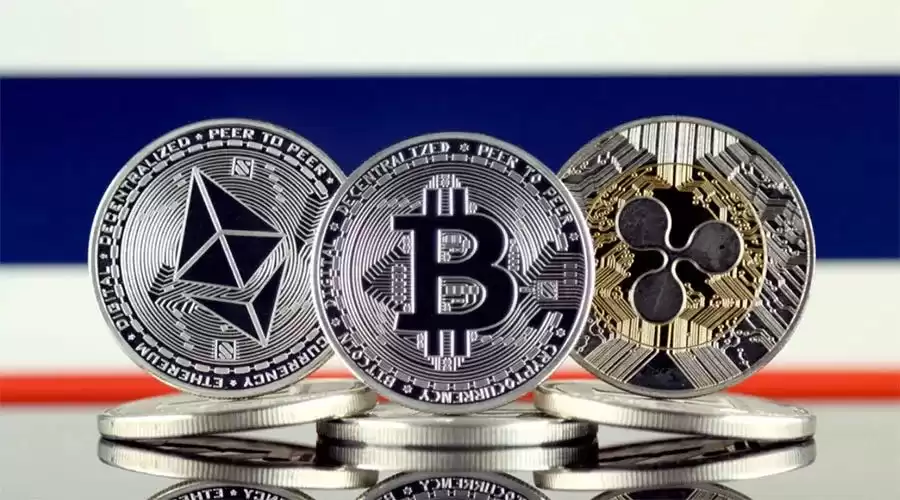-
 bitcoin
bitcoin $87959.907984 USD
1.34% -
 ethereum
ethereum $2920.497338 USD
3.04% -
 tether
tether $0.999775 USD
0.00% -
 xrp
xrp $2.237324 USD
8.12% -
 bnb
bnb $860.243768 USD
0.90% -
 solana
solana $138.089498 USD
5.43% -
 usd-coin
usd-coin $0.999807 USD
0.01% -
 tron
tron $0.272801 USD
-1.53% -
 dogecoin
dogecoin $0.150904 USD
2.96% -
 cardano
cardano $0.421635 USD
1.97% -
 hyperliquid
hyperliquid $32.152445 USD
2.23% -
 bitcoin-cash
bitcoin-cash $533.301069 USD
-1.94% -
 chainlink
chainlink $12.953417 USD
2.68% -
 unus-sed-leo
unus-sed-leo $9.535951 USD
0.73% -
 zcash
zcash $521.483386 USD
-2.87%
What Is an Algorithmic Stablecoin?
Algorithmic stablecoins, lacking real-world collateral, utilize a dynamic supply-demand mechanism to maintain a target price through minting or burning tokens, offering decentralization and inflation resistance but also posing risks of volatility and algorithmic failures.
Oct 16, 2024 at 03:13 pm

An algorithmic stablecoin is a type of cryptocurrency whose value is pegged to a target currency, such as the US dollar, through an algorithmic mechanism that adjusts the supply and demand of the stablecoin. Unlike fiat-backed stablecoins, algorithmic stablecoins do not hold any real-world assets as collateral.
2. MechanismAlgorithmic stablecoins maintain their peg through a combination of two processes:
Expansionary: When the stablecoin price falls below the target, the algorithm mints new tokens, increasing the supply. This drives up the demand and price of the stablecoin.
Contractionary: Conversely, when the stablecoin price rises above the target, the algorithm burns tokens, decreasing the supply and reducing the price.
Algorithmic stablecoins use various mechanisms to ensure price stability, including:
Seigniorage: Profits from the expansionary and contractionary processes are used to incentivize holders and stabilize the price.
Oracle: The algorithm relies on oracles to provide accurate data on the target currency's price.
Feedback Loop: The expansionary and contractionary processes create a negative feedback loop that helps the stablecoin converge to the target price.
Some notable algorithmic stablecoins include:
TerraUSD (UST)
Dai (DAI)
Basis Cash (BAC)
Fei Protocol (FEI)
Decentralization: Algorithmic stablecoins are not backed by a centralized entity, making them more resistant to censorship.
Inflation Resistance: The contractionary mechanism can help mitigate inflation by reducing the supply of the stablecoin.
Programmatic Transactions: Algorithmic stablecoins can facilitate programmable transactions, such as automatic payments or decentralized exchanges.
Volatility: Algorithmic stablecoins can experience significant price fluctuations while maintaining their peg.
Algorithmic Failures: The complex algorithms used in algorithmic stablecoins can introduce potential vulnerabilities.
Dependence on Oracles: The accuracy of the stablecoin's price peg relies heavily on the accuracy of the oracles used.
Disclaimer:info@kdj.com
The information provided is not trading advice. kdj.com does not assume any responsibility for any investments made based on the information provided in this article. Cryptocurrencies are highly volatile and it is highly recommended that you invest with caution after thorough research!
If you believe that the content used on this website infringes your copyright, please contact us immediately (info@kdj.com) and we will delete it promptly.
- Prime Vaults Launches on Berachain, Offering High Yields and Innovative 'On-Chain Savings Account'
- 2026-02-09 15:40:02
- Dogecoin's Wild Ride: Moonshot Dreams and the Inherent Risks of Meme Coin Mania
- 2026-02-09 13:10:02
- Big Banks, Crypto Market, and the Compromise Bill: A Regulatory Showdown Looms
- 2026-02-09 13:10:02
- Patriots Under Pressure: Super Bowl LVI Recap and Future Outlook
- 2026-02-09 13:05:01
- Gridiron Gold & Gilded History: Libertas Americana Medal Flips into Super Bowl 60 for 250th Anniversary Spotlight
- 2026-02-09 13:05:01
- Bithumb's Phantom Bitcoin Glitch Jolts Korean Crypto Exchange Stability
- 2026-02-09 13:00:01
Related knowledge

What is the future of cryptocurrency and blockchain technology?
Jan 11,2026 at 09:19pm
Decentralized Finance Evolution1. DeFi protocols have expanded beyond simple lending and borrowing to include structured products, insurance mechanism...

Who is Satoshi Nakamoto? (The Creator of Bitcoin)
Jan 12,2026 at 07:00am
Origins of the Pseudonym1. Satoshi Nakamoto is the name used by the individual or group who developed Bitcoin, authored its original white paper, and ...

What is a crypto airdrop and how to get one?
Jan 22,2026 at 02:39pm
Understanding Crypto Airdrops1. A crypto airdrop is a distribution of free tokens or coins to multiple wallet addresses, typically initiated by blockc...

What is impermanent loss in DeFi and how to avoid it?
Jan 13,2026 at 11:59am
Understanding Impermanent Loss1. Impermanent loss occurs when the value of tokens deposited into an automated market maker (AMM) liquidity pool diverg...

How to bridge crypto assets between different blockchains?
Jan 14,2026 at 06:19pm
Cross-Chain Bridge Mechanisms1. Atomic swaps enable direct peer-to-peer exchange of assets across two blockchains without intermediaries, relying on h...

What is a whitepaper and how to read one?
Jan 12,2026 at 07:19am
Understanding the Whitepaper Structure1. A whitepaper in the cryptocurrency space functions as a foundational technical and conceptual document outlin...

What is the future of cryptocurrency and blockchain technology?
Jan 11,2026 at 09:19pm
Decentralized Finance Evolution1. DeFi protocols have expanded beyond simple lending and borrowing to include structured products, insurance mechanism...

Who is Satoshi Nakamoto? (The Creator of Bitcoin)
Jan 12,2026 at 07:00am
Origins of the Pseudonym1. Satoshi Nakamoto is the name used by the individual or group who developed Bitcoin, authored its original white paper, and ...

What is a crypto airdrop and how to get one?
Jan 22,2026 at 02:39pm
Understanding Crypto Airdrops1. A crypto airdrop is a distribution of free tokens or coins to multiple wallet addresses, typically initiated by blockc...

What is impermanent loss in DeFi and how to avoid it?
Jan 13,2026 at 11:59am
Understanding Impermanent Loss1. Impermanent loss occurs when the value of tokens deposited into an automated market maker (AMM) liquidity pool diverg...

How to bridge crypto assets between different blockchains?
Jan 14,2026 at 06:19pm
Cross-Chain Bridge Mechanisms1. Atomic swaps enable direct peer-to-peer exchange of assets across two blockchains without intermediaries, relying on h...

What is a whitepaper and how to read one?
Jan 12,2026 at 07:19am
Understanding the Whitepaper Structure1. A whitepaper in the cryptocurrency space functions as a foundational technical and conceptual document outlin...
See all articles










































































